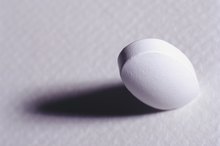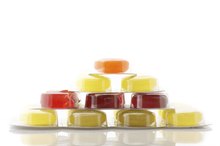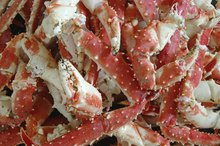What does fact checked mean?
At Healthfully, we strive to deliver objective content that is accurate and up-to-date. Our team periodically reviews articles in order to ensure content quality. The sources cited below consist of evidence from peer-reviewed journals, prominent medical organizations, academic associations, and government data.
- National Institutes of Health: Zinc - Fact Sheet for Consumers
- National Institutes of Health: Zinc - Fact Sheet for Health Professionals
The information contained on this site is for informational purposes only, and should not be used as a substitute for the advice of a professional health care provider. Please check with the appropriate physician regarding health questions and concerns. Although we strive to deliver accurate and up-to-date information, no guarantee to that effect is made.
Even if the phrase "A banana a day keeps the doctor away" hasn't found a place in the lexicon of food-related rhymes, bananas can improve your health. This yellow fruit is not only versatile, but it's also packed with vitamins and minerals. Among the banana's minerals is zinc, which can positively affect your health in several ways. Bananas alone, however, won't provide you with enough zinc to meet your daily needs.
Zinc's Role in Your Health
According to the National Institutes of Health, zinc plays a helpful role in strengthening your immune system to help you fight off viruses and bacteria 12. Zinc also contributes to the production of protein and DNA, speeds up your body's healing process and contributes to your ability to smell and taste accurately. This mineral is pivotal in the healthy growth of babies in the womb and as they progress through childhood and adolescence.
Recommended Zinc Intake
Zinc Citrate Side Effects
Learn More
Your body doesn't store zinc, which means you need to consistently consume this mineral to ensure its ability to do its job. Adult males should consume 11 milligrams of zinc per day, while adult females should consume 8 milligrams of zinc per day. If you're pregnant, aim for 11 milligrams per day, and if you're lactating, consume 12 milligrams of zinc per day.
Bananas Aren't Enough
Although bananas contain zinc, eating a single serving of the fruit doesn't play a major role in helping you work toward your recommended zinc intake. According to the U.S. Department of Agriculture's National Nutrient Database, a 7-inch banana contains just 0.18 milligram of zinc 3. A 9-inch banana contains a slightly higher amount of the mineral, but only 0.23 milligram.
Animal Products Provide Zinc
Side Effects of Zinc Lozenges
Learn More
It's not practical to attempt to solely eat bananas to reach your recommended intake of zinc. Instead, supplement your diet with zinc-rich foods such as beef, pork or chicken. Three ounces of braised beef chuck roast has 7 milligrams of zinc, while 3-ounce servings of a pork chop and dark chicken meat have 2.9 and 2.4 milligrams of zinc, respectively. If you don't eat meat, focus on foods such as baked beans and low-fat yogurt. A 1/2-cup serving of baked beans has 2.9 milligrams of zinc, and an 8-ounce serving of yogurt has 1.7 milligrams. Supplements can also help you boost your zinc intake.
- It's not practical to attempt to solely eat bananas to reach your recommended intake of zinc.
- Three ounces of braised beef chuck roast has 7 milligrams of zinc, while 3-ounce servings of a pork chop and dark chicken meat have 2.9 and 2.4 milligrams of zinc, respectively.
Related Articles
References
- National Institutes of Health: Zinc - Fact Sheet for Consumers
- National Institutes of Health: Zinc - Fact Sheet for Health Professionals
- U.S. Department of Agriculture National Nutrient Database for Standard Reference: Bananas, Raw
- Prasad, A. S., Mantzoros, C. S., Beck, F. W., Hess, J. W., & Brewer, G. J. (1996). Zinc status and serum testosterone levels of healthy adults. Nutrition, 12(5), 344-348.
- Yang, Y., Jing, X. P., Zhang, S. P., Gu, R. X., Tang, F. X., Wang, X. L., ... & Wang, J. Z. (2013). High dose zinc supplementation induces hippocampal zinc deficiency and memory impairment with inhibition of BDNF signaling. PLoS One, 8(1), e55384.
- Amani, R., Saeidi, S., Nazari, Z., & Nematpour, S. (2010). Correlation between dietary zinc intakes and its serum levels with depression scales in young female students. Biological Trace Element Research, 137(2), 150-158.
- Table, E., & Table, V. (2001). Dietary reference intakes for vitamin A, vitamin K, arsenic, boron, chromium, copper, iodine, iron, manganese, molybdenum, nickel, silicon, vanadium, and zinc.
- Wilborn, C. D., Kerksick, C. M., Campbell, B. I., Taylor, L. W., Marcello, B. M., Rasmussen, C. J., ... & Kreider, R. B. (2004). Effects of zinc magnesium aspartate (ZMA) supplementation on training adaptations and markers of anabolism and catabolism. Journal of the International Society of Sports Nutrition, 1(2), 12.
- Brilla, L. R., & Conte, V. (2000). Effects of a novel zinc-magnesium formulation on hormones and strength. Journal of Exercise Physiology Online, 3(4), 26-36.
- Kara, E., Gunay, M., Cicioglu, I., Ozal, M., Kilic, M., Mogulkoc, R., & Baltaci, A. K. (2010). Effect of zinc supplementation on antioxidant activity in young wrestlers. Biological Trace Element Research, 134(1), 55-63. Â
- Bao, B., Prasad, A. S., Beck, F. W., Fitzgerald, J. T., Snell, D., Bao, G. W., ... & Cardozo, L. J. (2010). Zinc decreases C-reactive protein, lipid peroxidation, and inflammatory cytokines in elderly subjects: a potential implication of zinc as an atheroprotective agent. The American Journal of Clinical Nutrition, 91(6), 1634-1641.
- Espinoza, A., Le Blanc, S., Olivares, M., Pizarro, F., Ruz, M., & Arredondo, M. (2012). Iron, copper, and zinc transport: inhibition of divalent metal transporter 1 (DMT1) and human copper transporter 1 (hCTR1) by shRNA. Biological Trace Element Research, 146(2), 281-286.
- Tandy, S., Williams, M., Leggett, A., Lopez-Jimenez, M., Dedes, M., Ramesh, B., ... & Sharp, P. (2000). Nramp2 expression is associated with pH-dependent iron uptake across the apical membrane of human intestinal Caco-2 cells. Journal of Biological Chemistry, 275(2), 1023-1029.
- Festa, M. D., Anderson, H. L., Dowdy, R. P., & Ellersieck, M. R. (1985). Effect of zinc intake on copper excretion and retention in men. The American Journal of Clinical Nutrition, 41(2), 285-292
Resources
Writer Bio
Toronto-based journalist William McCoy has been writing since 1997, specializing in topics such as sports, nutrition and health. He serves as the Studio's sports and recreation section expert. McCoy is a journalism graduate of Ryerson University.









